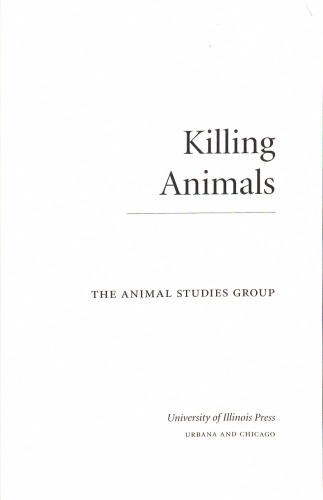Product desciption
Killing Animals The Animal Studies Group Steve Baker Jonathan Burt by The Animal Studies Group (steve Baker, Jonathan Burt, Diana Donald, Erica Fudge, Garrymarvin, Robert Mckay, Clare Palmer And Chris Wilbert) 9780252072901, 0252072901 instant download after payment.
Though not often acknowledged openly, killing represents by far the most common form of human interaction with animals. Humans kill animals for food, for pleasure, to wear, and even as religious acts, yet despite the ubiquity of this killing, analyzing the practice has generally remained the exclusive purview of animal rights advocates. Killing Animals offers a corrective to this narrow focus by bringing together the insights of scholars from diverse backgrounds in the humanities, including art history, anthropology, intellectual history, philosophy, literary studies, and geography. With killing representing the ultimate expression of human power over animals, the essays reveal the complexity of the phenomenon by exploring the extraordinary diversity in killing practices and the wide variety of meanings attached to them. They examine aspects of the role of animals in human societies, from the seventeenth century to the present day: their cultural manifestations, and how they have been represented. feral and stray animals; animal death in art, literature and philosophy; and even animals that themselves become killers of humans. While many collections originate as a series of separately planned conference papers drawn together only by editorial fiat, the essays that comprise Killing Animals were regarded as parts of a larger whole from their inception. The result is a remarkably collaborative, cross-disciplinary work that includes eight individually authored chapters and a collectively written introduction. Rather than attempting to produce a single ethical understanding from their diverse views, however, the group aims instead to demonstrate the value of the wider academic study of the place of animals in human history. The conclusion to Killing Animals takes the form of a discussion among the eight contributors, with each expanding upon issues raised earlier in the book.
The Animal Studies Group consists of the following British scholars: Steve Baker (art history, University of Central Lancashire); Jonathan Burt (independent scholar); Diana Donald (art history, Manchester Metropolitan University); Erica Fudge (literary and cultural studies, Middlesex University); Garry Marvin (social anthropology, Roehampton University); Robert McKay (literature, University of Sheffield); Clare Palmer (philosophy and environmental studies, Washington University in St. Louis); and Chris Wilbert (geography, Anglia Ruskin University).


